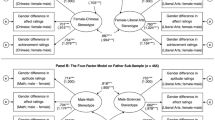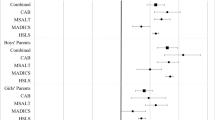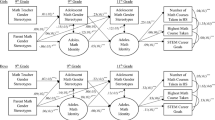Abstract
The present study was designed to examine whether parents’ views of their child’s academic competencies are structured by gendered conceptions of abilities. In a longitudinal research design, a group of parents (N = 391) were asked to assess their third-grade child’s competence in mathematics and Finnish and to respond to a set of attitude statements; when the child reached the fifth grade, the parents were asked to reassess his/her competencies. It was found that the influence of the gender stereotype was partly domain-specific: The stereotype concerning Finnish organized the parental competence assessments as early as the child’s third grade and also predicted the assessments made about the child over the next two grades, whereas the stereotype concerning mathematics only predicted the assessments made as late as the fifth grade. In the Finnish competence assessments, the gender stereotype moderated the overall gender-of-the-child effect, whereas in the mathematics competence assessments, the gender-of-the-child effect was evinced only by the parent group that endorsed the gender stereotype. Culture-bound gender expectations and attitudes toward the expectations are significant, then, for parents’ assessments of their child’s competencies as early as the elementary school years.
Similar content being viewed by others
References
Bhanot, R., & Jovanovic, J. (2005). Do parents’ academic gender stereotypes influence whether they intrude on their children’s homework? Sex Roles, 52, 597–607.
Eccles, J., Jacobs, E., & Harold, R. (1990). Gender role stereotypes, expectancy effects, and parents’ socialization of gender differences. Journal of Social Issues, 46, 183–201.
Fredricks, J., & Eccles, J. (2002). Children’s competence and value beliefs from childhood through adolescence: Growth trajectories in two male-sex-typed domains. Developmental Psychology, 38, 519–533.
Frome, P., & Eccles, J. (1998). Parents’ influence on children’s achievement-related perceptions. Journal of Personality and Social Psychology, 52, 435–452.
Galper, A., Wigfield A., & Seefeldt, C. (1997). Head Start parents’ beliefs about their children’s abilities, task values, and performances on different activities. Child Development, 68, 897–907.
Gordon, T., Holland, J., & Lahelma, T. (2000). Making spaces: Citizenship and difference in schools. London: MacMillan.
Hughes, M., Wikeley, F., & Nash, T. (1994). Parents and their children’s schools. Oxford: Blackwell.
Jacobs, J. (1991). Influence of gender stereotypes on parent and child mathematics attitudes. Journal of Educational Psychology, 83, 518–527.
Jacobs, J., & Eccles, J. (1992). The impact of mothers’ gender-role stereotypic beliefs on mothers’ and children’s ability perceptions. Journal of Personality and Personality Psychology, 63, 932–944.
Kasanen, K., Räty, H., & Snellman, L. (2001). Seating order as a symbolic arrangement. European Journal of Psychology of Education, 16, 209–222.
Kasanen, K., Räty, H., & Snellman, L. (2003). Learning the class test. European Journal of Psychology of Education, 18, 43–58.
Kupari, P. (1996). Laskutaidotko kadonneet? Peruskoululaiset matematiikan kokijoina ja taitajina [Mathematical proficiency among the comprehensive school pupils]. In P. Linnakylä & H. Saari (Eds.), Oppiiko oppilas peruskoulussa? Peruskoulun arviointi 90 -tutkimuksen tuloksia [Does a student learn in the comprehensive school? A survey of the learning outcomes of the comprehensive school] (pp. 27–56). Jyväskylä: Kasvatustieteiden tutkimuslaitos.
Lappalainen, H.-P. (2003). Osaat lukea - miten osaat kirjoittaa? Perusopetuksen 6. vuosiluokan suorittaneiden äidinkielen ja kirjallisuuden oppimistulosten arviointi [You can read—how well can you write? An evaluation of learning in the mother tongue and literature among the 6th graders]. Helsinki: Board of Education.
Lummins, M., & Stevenson, H. W. (1990). Gender differences in beliefs and achievement: A cross-cultural study. Developmental Psychology, 26, 254–263.
Miller, S., Manhal, M., & Mee, L. (1991). Parental beliefs, parental accuracy, and the children’s cognitive performance. Developmental Psychology, 27, 267–276.
Operario, D., & Fiske, S. (2001). Stereotypes: Content, structures, and context. In R. Brown & S. Gaertner (Eds.), Intergroup processes (pp. 22–44). Oxford: Blackwell.
PISA (2005). Learning for tomorrow’s world - First results from PISA (The Programme for International Student Assessment) 2003. OECD Publications.
Räty, H. (2003). At the threshold of school: Parental assessments of the competencies of their preschool-aged children. Journal of Applied Social Psychology, 33, 1862–1877.
Räty, H., Kasanen, K., & Honkalampi, K. (2006). Three years later: A follow-up study of parents’ assessments of their children’s competencies. Journal of Applied Social Psychology, 36, 2079–2099.
Räty, H., & Snellman, L. (1998). Social representations of educability. Social Psychology of Education, 1, 359–373.
Räty, H., Vänskä, J., Kasanen, K., & Kärkkäinen, R. (2002). Parents’ explanations of their child’s performance in mathematics and reading: A replication and extension of Yee and Eccles. Sex Roles, 46, 121–128.
Schwarz, N., & Strack, F. (1991). Context effects in attitudes surveys. In W. Stroebe & M. Hewstone (Eds.), European Journal of Social Psychology, vol 2 (pp. 31–50). Chichester: Wiley.
Selleri, P., Carugati, F., & Scappini, E. (1995). What marks should I give? A model of the organization of teachers’ judgements of their pupils. European Journal of Psychology of Education, 10, 25–40.
Stetsenko, A., Little, T., Gordeeva, T., Grasshof, M., & Oettingen, G. (2000). Gender effects in children’s beliefs about school performance: A cross-cultural study. Child Development, 71, 517–527.
Swim, J. K., & Campbell, B. (2001). Sexism: Attitudes, beliefs, and behaviors. In R. Brown & S. Gaertner (Eds.), Intergroup processes (pp. 218–237). Oxford: Blackwell.
Tiedemann, J. (2000). Parents’ gender stereotypes and teachers’ beliefs as predictors of children’s concept of their mathematical ability in elementary school. Journal of Educational Psychology, 92, 144–151.
Yee, D., & Eccles, J. (1988). Parent perceptions and attributions for children’s math achievement. Sex Roles, 19, 317–333.
Author information
Authors and Affiliations
Corresponding author
Rights and permissions
About this article
Cite this article
Räty, H., Kasanen, K. Gendered Views of Ability in Parents’ Perceptions of Their Children’s Academic Competencies. Sex Roles 56, 117–124 (2007). https://doi.org/10.1007/s11199-006-9153-5
Published:
Issue Date:
DOI: https://doi.org/10.1007/s11199-006-9153-5




